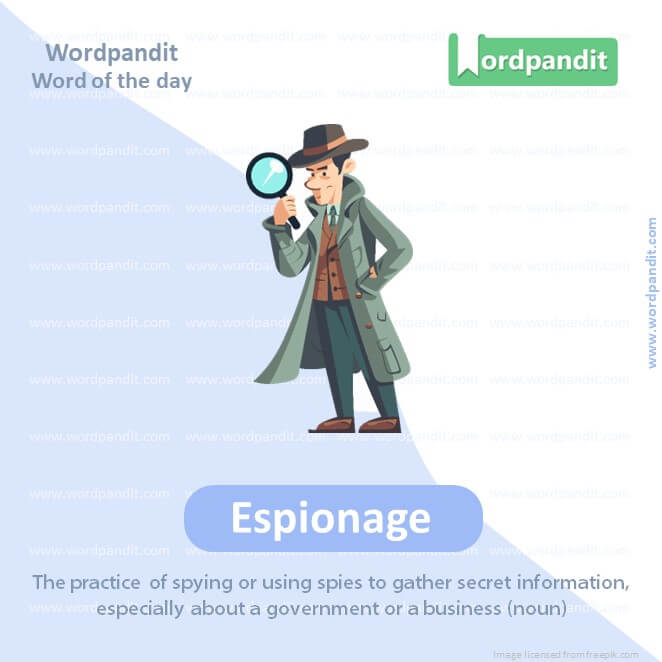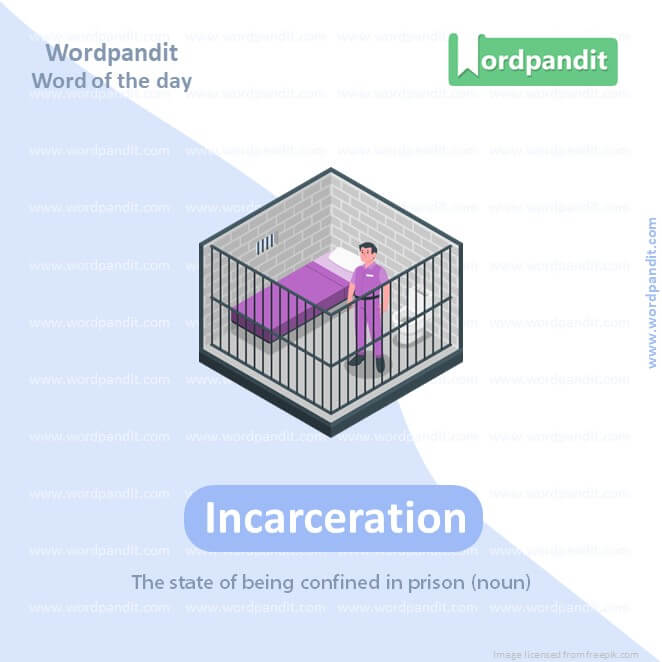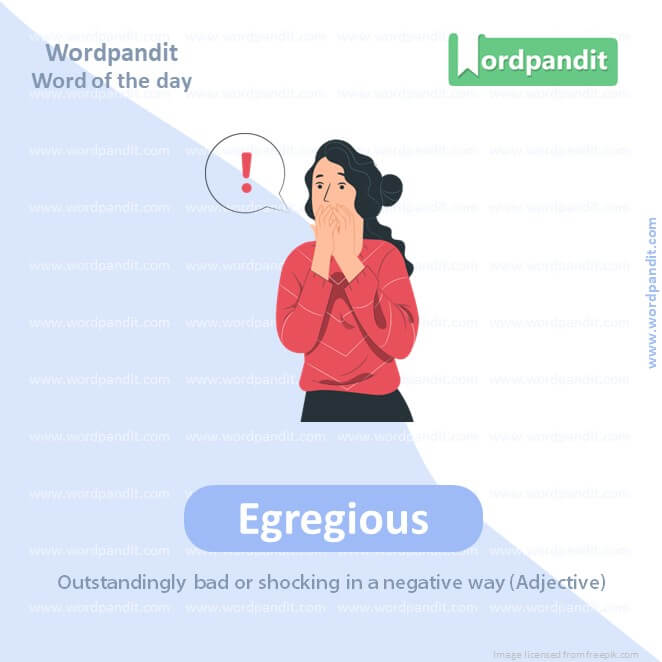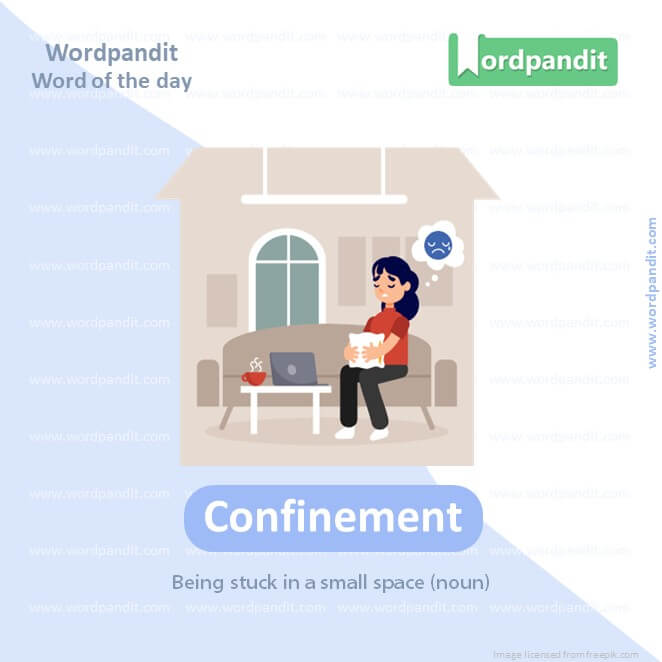Daily Vocabulary Words: List of Daily Used Words in Leading International Newspapers
Hi there. Welcome to this special section @ Wordpandit.
Our endeavour here is very simple: to highlight important daily vocabulary words, which you would come across in leading newspapers in the country. We have included the following newspapers in our selection:
• The New York Times
• The Washington Post
• Scientific American
• BBC
• The Guardian
• Psychology Today
• Wall Street Journal
• The Economist
We are putting in extensive work for developing your vocabulary. All you have got to do is be regular with this section and check out this post on a daily basis. This is your repository of words that are commonly used and essentially, we are posting a list of daily used words. Hence, this has significant practical application as it teaches you words that are used commonly in leading publications mentioned above.
Visit the website daily to learn words from leading international newspapers.
WORD-1: Letting
CONTEXT: the major tech companies show little sign of letting up in 2024 despite being mostly profitable, in some cases handsomely so.
SOURCE: New York Times
EXPLANATORY PARAGRAPH: Letting is like when you have a toy and you allow your friend to play with it. You are letting them use it because you are being nice and sharing.
MEANING: The action of allowing someone to use or rent something (noun).
PRONUNCIATION: LET-ing
SYNONYMS: Renting, leasing, hiring, permitting, allowing
USAGE EXAMPLES:
1. They considered letting their spare room to a student.
2. Letting out the old cottage provided them with extra income.
3. The company is letting office space in the city center.
4. By letting her borrow the dress, she made her friend very happy.
WORD-2: Downsizing
CONTEXT: Meta’s shares are up over 170 percent amid its downsizing talk.
SOURCE: New York Times
EXPLANATORY PARAGRAPH: Downsizing is when a company decides to have fewer workers or things because it wants to save money or it doesn’t need as much anymore. It’s like if you have too many toys and decide to keep only the ones you really like.
MEANING: The process of reducing the number of employees or the size of something (noun).
PRONUNCIATION: DOWN-syz-ing
SYNONYMS: Reduction, cutback, trimming, shrinkage, retrenchment
USAGE EXAMPLES:
1. The company announced downsizing due to financial difficulties.
2. Downsizing the team meant that fewer people had to do more work.
3. After downsizing, the office felt emptier and quieter.
4. He faced the challenge of downsizing his massive book collection.
WORD-3: Churning
CONTEXT: These layoffs are part of a tide of disruption that is continually churning the work days in corporations everywhere.
SOURCE: New York Times
EXPLANATORY PARAGRAPH: Churning is like when you stir your ice cream really fast until it gets all mixed up and changes a bit. It’s moving something around quickly or a lot of activity happening in one place.
MEANING: The act of agitating or stirring something vigorously (verb).
PRONUNCIATION: CHUR-ning
SYNONYMS: Stirring, agitating, whipping, mixing, swirling
USAGE EXAMPLES:
1. The machine was churning the milk to make butter.
2. Her stomach was churning with nerves before the performance.
3. The rumor mill was churning with the latest gossip.
4. Waves were churning up the sand on the beach.
WORD-4: Unrelenting
CONTEXT: the unrelenting uncertainty and the upheaval that have become constant features of business life today.
SOURCE: New York Times
EXPLANATORY PARAGRAPH: Unrelenting is like when you keep trying and trying, without stopping, even if something is hard. It’s like continuing to ride your bike, even after falling off, without giving up.
MEANING: Not yielding or softening; remaining harsh or determined (adjective).
PRONUNCIATION: un-re-LENT-ing
SYNONYMS: Persistent, relentless, inexorable, constant, ceaseless
USAGE EXAMPLES:
1. The unrelenting heat of the desert was exhausting.
2. She admired his unrelenting pursuit of justice.
3. The unrelenting rain spoiled their picnic plans.
4. He faced his illness with unrelenting bravery.

WORD-5: Espionage
CONTEXT: Evan Gershkovich of The Wall Street Journal, will soon mark a year in the infamous Lefortovo prison, awaiting trial on charges of espionage.
SOURCE: New York Times
EXPLANATORY PARAGRAPH: Espionage is like playing a secret spy game where you try to find out secrets from someone else without them knowing. It’s when people gather secret information in a very sneaky way.
MEANING: The practice of spying or using spies to gather secret information,
especially about a government or a business (noun)
PRONUNCIATION: ES-pee-uh-nahj
SYNONYMS: Spying, intelligence, surveillance, reconnaissance, infiltration
USAGE EXAMPLES:
1. He was charged with espionage for leaking classified documents.
2. The espionage novel was filled with thrilling secret missions.
3. During the war, espionage was a key tool for gaining enemy secrets.
4. She worked in espionage, gathering information on rival companies.

WORD-6: Incarceration
CONTEXT: Their incarceration is a violation of their rights and an assault on foreign journalists that is even more egregious than what transpired under Soviet rule.
SOURCE: New York Times
EXPLANATORY PARAGRAPH: Incarceration is like being put in time-out, but for adults, and it happens in a special place called a jail or prison. It’s when someone is kept in a place and can’t leave because they broke a big rule.
MEANING: The state of being confined in prison (noun)
PRONUNCIATION: in-kahr-suh-RAY-shuhn
SYNONYMS: Imprisonment, confinement, detention, custody, jailing
USAGE EXAMPLES:
1. His incarceration lasted for two years before he was released.
2. The judge ordered the incarceration of the criminal for his crimes.
3. Stories of his life during incarceration were both sad and inspiring.
4. Advocates argue against the high rates of incarceration in some countries.

WORD-7: Egregious
CONTEXT: Their incarceration is a violation of their rights and an assault on foreign journalists that is even more egregious than what transpired under Soviet rule.
SOURCE: New York Times
EXPLANATORY PARAGRAPH: Egregious is a word you use to describe something that is really bad or wrong, much more than usual. It’s like if someone broke a rule in a game in a very big and unfair way.
MEANING: Outstandingly bad or shocking in a negative way (Adjective)
PRONUNCIATION: eh-GREE-jus
SYNONYMS: Appalling, atrocious, horrendous, shocking, flagrant
USAGE EXAMPLES:
1. The judge described the act as an egregious violation of trust.
2. Her behavior at the party was egregious and upset many guests.
3. The company’s neglect of safety standards was an egregious error.
4. His egregious mistake cost the team the championship.
WORD-8: Accreditation
CONTEXT: He is a reporter, a correspondent for The Wall Street Journal who worked in Moscow with official accreditation from the Russian government until he was taken prisoner by a secretive police unit in Yekaterinburg on March 29, 2023.
SOURCE: New York Times
EXPLANATORY PARAGRAPH: Accreditation is like getting a gold star sticker that shows a school or a company is really good and follows all the rules. It means they have been checked and approved by important people who decide they are doing things the right way.
MEANING: The process of certifying that an organization or individual has met a set of standards (noun).
PRONUNCIATION: ak-red-i-TAY-shuhn
SYNONYMS: Certification, endorsement, approval, recognition, sanction
USAGE EXAMPLES:
1. The university’s accreditation was renewed after a thorough review.
2. Accreditation is important for colleges to ensure they meet educational standards.
3. The hospital worked hard to meet the standards for accreditation.
4. Losing its accreditation could seriously damage the institution’s reputation.

WORD-9: Starkly
CONTEXT: the Kremlin under Mr. Putin has dealt ruthlessly with any opposition, as demonstrated most starkly by the sudden death last month of Aleksei Navalny, Mr. Putin’s most prominent opponent.
SOURCE: New York Times
EXPLANATORY PARAGRAPH: Starkly is when something is very clear or obvious, like the difference between night and day. It’s used to describe how something stands out a lot and can’t be missed.
MEANING: In a way that is severe or obvious in appearance or outline (adverb).
PRONUNCIATION: STAR-klee
SYNONYMS: Clearly, sharply, distinctly, plainly, markedly
USAGE EXAMPLES:
1. The two opinions were starkly opposed, leaving no room for compromise.
2. The evidence was starkly evident, proving his innocence.
3. Her new style was starkly different from her usual attire.
4. The wealth gap in the city was starkly visible.

WORD-10: Confinement
CONTEXT: Mr. Gershkovich will soon have spent a year at Lefortovo, which was built in the 19th century and was notorious in the Soviet era as an interrogation center for political prisoners, who are typically held in solitary confinement.
SOURCE: New York Times
EXPLANATORY PARAGRAPH: Confinement is like being grounded and having to stay in your room, not being able to go out and play. It means being in a place where you can’t leave, usually for a certain amount of time.
MEANING: Being stuck in a small space (noun)
PRONUNCIATION: kun-FINE-muhnt
SYNONYMS: Imprisonment, captivity, detention, incarceration, restraint
USAGE EXAMPLES:
1. His confinement in the small room made him feel very lonely.
2. The animal was kept in confinement for its own safety.
3. She struggled with the confinement of city life.
4. The confinement period after the surgery was challenging but necessary for recovery.
Vocabulary Difficult Words
In our journey of language learning, an encounter with ‘vocabulary difficult words’ is inevitable. These seemingly intimidating terms can often seem like stumbling blocks. However, they also offer a unique chance to deepen our understanding and competence in the language. With a strategic approach, learning ‘vocabulary difficult words’ can become less daunting and more of an empowering undertaking.
To befriend ‘vocabulary difficult words’, comprehension is key. Familiarize yourself with the meaning, usage, and context of these words. Utilize different resources such as books, documentaries, online articles, and digital content. This contextual exposure can ease the process of understanding ‘vocabulary difficult words’.
Challenging as they may seem, ‘vocabulary difficult words’ can be tamed with appropriate memory tactics. Use of flashcards or digital language learning apps that support active recall and spaced repetition can be effective. To foster deeper connections with ‘vocabulary difficult words’, employ mnemonic techniques. This cognitive strategy, involving association of new information to known concepts or stories, aids in better retention and recall.
Another essential in mastering ‘vocabulary difficult words’ is practice. Be it in conversations, written communications, or social media interactions, endeavor to incorporate these words. Practice not only reinforces your knowledge but also enhances your confidence in using these words.
In conclusion, navigating the terrain of ‘vocabulary difficult words’ involves a confluence of comprehension, memory tactics, and active practice. These strategies, interwoven, help transform intimidating words into familiar friends. By conquering ‘vocabulary difficult words’, you not only augment your vocabulary but also elevate your language skills. Remember, every challenging word unlocked is yet another ornament in your linguistic archive. So, delve deep into the ‘vocabulary difficult words’, and uncover the treasures they hold.







